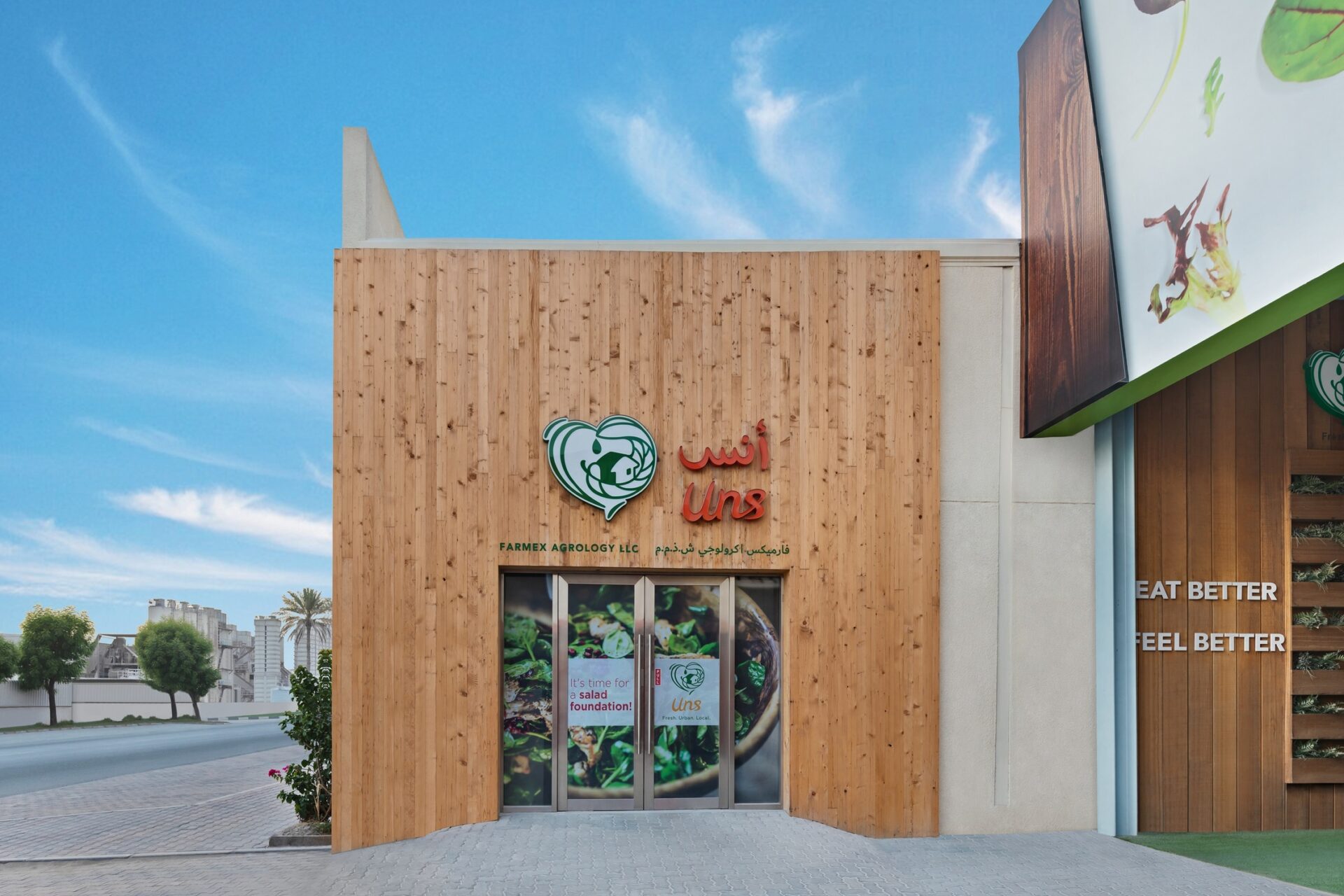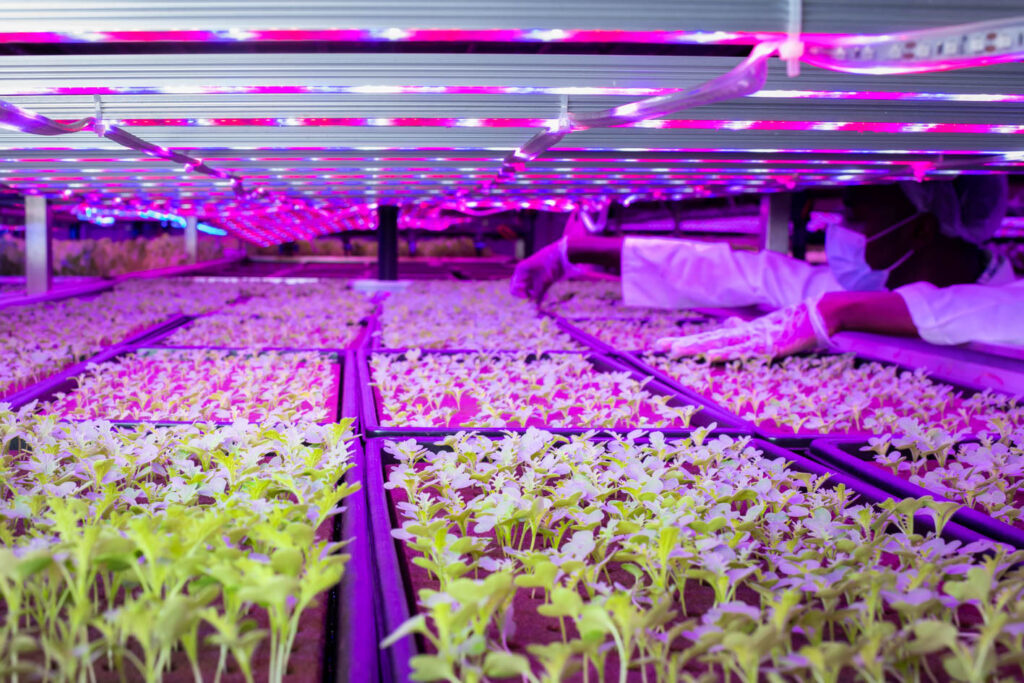
Redefining Urban Agriculture: Sustainable Farming with UNS Farms
Discover how UNS Vertical Farms is leading the way in sustainable urban farming in the UAE. Learn about their innovative practices, commitment to food security, and community-driven approach to creating a greener future.
About UNS Farms
UNS Farms, a division of Speedex Group, is transforming urban food production in Dubai with sustainable, vertical farming. Established in 2018, it is the largest urban farm in the city, producing 1,000 to 1,500 kg of pesticide-free, nutrient-rich vegetables daily. By using hydroponics, UNS Farms conserves 90% more water and yields twice the produce per square meter. Committed to sustainability and community well-being, it also offers expertise in modernizing farm systems and urban agriculture solutions. UNS Farms brings fresh, local food to the UAE, supporting a healthier planet and future.
For more details, visit unsfarms.com
Mehlam Murtaza: Executive Director, UNS Vertical Farms

Mehlam Murtaza is the Executive Director of UNS Vertical Farms, part of Speedex Group, leading sustainable agriculture in the GCC. Established in 2018, UNS Farms leverages advanced vertical farming to provide fresh, locally grown produce year-round in the UAE.
Under Mehlam’s leadership, the farm specializes in high-quality fruits, vegetables, and microgreens while focusing on reducing environmental impact and promoting food security. With innovation and sustainability at its core, UNS Farms delivers fresh, nutritious produce 365 days a year.
With a focus on sustainability and innovation, Mehlam is driving a new era of agriculture that balances health, quality, and environmental stewardship.
To gain deeper insights into the impact and vision of UNS Farms, our Editor-In-Chief, Prachi Bishnoi, sat down with Mr. Mehlam Murtaza. In this conversation, he discusses his journey, the challenges faced, and the future of sustainability in Dubai.
Q.1 UNS Vertical Farms has become a leader in sustainable urban agriculture. Can you share what inspired you to pursue vertical farming and how it aligns with the environmental goals of the GCC region?
UNS Vertical Farms, a division of Speedex Group since 2018, is the pioneer leader in vertical farming in the UAE region. We are inspired with the idea of how we can provide fresh, nutritious, affordable food to urban populations while minimizing environmental impact.
We wanted to bring traditional agriculture to the urban lands with a twist of technology keeping our foundation in mind. Traditional agriculture requires vast amounts of land and water and is dependent on weather and the use of chemicals and pesticides. With vertical farming, we saw an opportunity to grow high-quality produce sustainably by using the Hydroponics technique and Controlled Environment Agriculture (CEA). We also reduce transportation, thereby cutting down on emissions and waste.
We align with the UAE’s sustainability goals, including reducing carbon emissions by 70% and water consumption by 30% by 2050, as well as the Green Agenda 2030’s commitment to sustainable resource use.
Ultimately, UNS Vertical Farms is driven by a vision to create a future where fresh, local food can thrive within urban landscapes, benefiting both people and the planet.
Q.2 Vertical farming is known for its efficiency in resource usage, especially water. Could you explain how UNS Farms’ hydroponic system works and its impact on water conservation compared to traditional farming?
The reason for leveraging hydroponics technology in UNS Farms is that hydroponics is the cultivation of plants with water and nutrient solutions rather than soil. The roots grow into a liquid solution that is fortified with all the essential nutrients for healthy plants. It’s particularly transformative when it comes to water conservation. Unlike traditional farming, which wastes water through runoff and evaporation, our system recirculates water in a closed loop. Thus, we are able to use 90% less water than conventional farming. Every drop is accounted for, recirculated, and reused.

Q.3 Food security is a significant challenge globally and particularly in the GCC. How does UNS Vertical Farms contribute to enhancing local food security, and what role does sustainability play in that mission?
The available land is steadily decreasing due to urbanization, deforestation, and soil degradation. At the same time, climate changes, and natural calamities like droughts to floods, make consistent food production increasingly challenging. At UNS Vertical Farms, we see ourselves as part of the solution to this challenge, providing fresh, nutrient-dense, and affordable produce all around the year – right here in the region. By leveraging technology-driven farming solutions with Controlled Environment Agriculture (CEA), we are transforming environmental challenges into opportunities for sustainable, localized food production. This approach can be implemented anywhere in the world.
Q.4 UNS Farms produces a wide range of pesticide-free, nutrient-rich vegetables. How do your farming practices support both environmental health and consumer wellness?
Our vertical farming practices are designed to support both environmentally healthy and consumer wellness. Our methods eliminate the use of harmful chemicals, and the produce we receive is as close to its natural state as possible. Additionally, we also conserve water.
We prioritize sourcing recyclable materials for our operations to ensure they can be repurposed at the end of their lifecycle. We collaborate with paper recycling plants to repurpose our cardboard and paper, minimizing waste. Additionally, we compost our organic waste, which is either reused as input for our farming or sold to local home gardeners for their use. This commitment to circular practices helps reduce our environmental impact and supports sustainable resource management.
We believe nourishment begins with how food is grown. Our vegetables are nutrient-rich and pesticide-free, offering a choice that’s better for both our customers and the planet.

Q.6 Could you talk about the decision to use urban spaces for farming and how UNS Farms is helping redefine the landscape of agriculture in urban settings?
Our decision to utilize urban spaces is laid in our name UNS ie. U-Urban N- Nutritious S-Sustainable Farming.
Urban farming minimizes the long-distance transport that conventional agriculture relies on, which not only reduces carbon emissions but also ensures that people get fresher food. Vertical farming enables greater quantities with the same available space.
At UNS Farms, we are redefining what agriculture can look like in urban settings that can produce vertically, which allows us to maximize space eliminating the dependency on natural climatic conditions. Thus, we can produce herbs, microfibers, edible flowers, etc all around the year.

Q.7 What challenges do you face in maintaining sustainability standards while scaling production, and how do you overcome them?
One of the key challenges we face in maintaining sustainability while scaling production is managing the energy consumption of our farms. Artificial lighting, climate control, and other necessary equipment require significant energy, and we have a vision to adapt to renewable resources for our consumption. Thus, we are also exploring more energy-efficient technologies for lighting and climate control.
Q.8 With a growing population, urban agriculture is a vital solution. What are your future plans to expand UNS Farms’ impact on sustainable food production in the region?
A growing population has a growing need. But since we have limited resources we need the intervention of technology and have smart solutions to fulfill the requirements. Urban agriculture is a similar initiative with the ability to produce more with limited resources.
We act as a solution by increasing food production with optimal use of limited resources. Our plan is not just to produce but to lead a shift toward greener cities and food systems that are healthier, more resilient, and closer to the people they serve.
Looking ahead, one of our biggest plans is to expand our network of urban farms across the GCC region. We’re focused on setting up more facilities in key urban centers so we can meet the demand for fresh, local produce without relying on long supply chains.
By expanding our reach, innovating our methods, and engaging with communities, we hope to drive real change in how food is produced, consumed, and valued.
Q.8 How does UNS Farms engage with the local community to raise awareness about sustainable agriculture and the benefits of locally grown food?
We engage the community through farm visits and tours, offering students and local groups a hands-on understanding of how food is grown in a controlled environment, from seed to harvest. These experiences spark curiosity and appreciation for locally grown produce.
Through workshops, events like farmers’ markets and organic expos, and partnerships with schools and community organizations, we educate and empower people to make sustainable choices.
On social media, we share tips, recipes, and insights into our farming process, making fresh, local produce approachable and relevant to urban lifestyles.
Q.9 What advice would you give to other agricultural enterprises in the region aiming to adopt more sustainable practices?
For any agricultural enterprise looking to adopt more sustainable practices, my first piece of advice would be to start small and build from there.
- Adopt Smart Farming Technologies
- Enhance Water and Energy Efficiency: Implement drip irrigation, water recycling, and renewable energy solutions to reduce environmental impact.
- Collaborate for Innovation: Partner with research institutions and community groups to scale sustainable practices and share knowledge.
- Educate and Inspire: Engage communities through workshops and awareness programs to promote sustainable farming and consumption habits.

Prachi, an accomplished Chief-Editor at The Sustainable Brands Journal, has 15+ years of experience in Europe, the Middle East, and India, managing 90+ global sustainable brands. She’s a prolific writer in sustainability, contributing to various publications. Prachi’s unwavering passion and expertise make her a recognized authority, driving positive change and inspiring a sustainable future.





